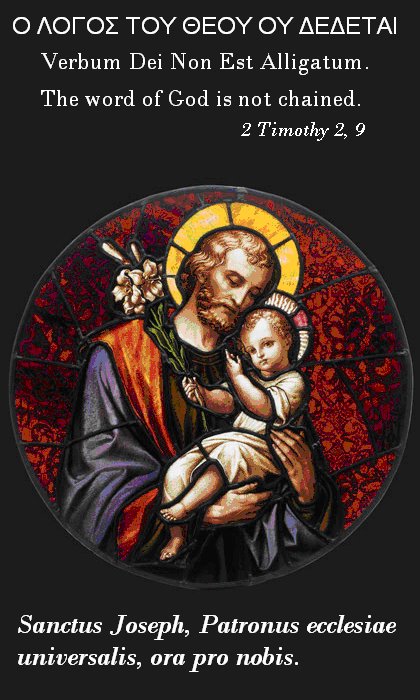Richard Neuhaus reports the following anecdote of the late, great Cardinal Avery Dulles (requiescat in pace). Once when giving a talk at a parish church, the Cardinal noticed a large banner strung across the entrace that read "God is other people". His gut reaction was to take a magic marker to the sign and put an "emphatic comma" after the word "other". (Of course, he restrained himself.)
The attitude reflected in that banner, and the idea too frequently heard in a number of sermons, is that we find God in our fellow human beings or nowhere. It's almost as if, when asked what the greatest command of the law was, Jesus had answered: "Love the Lord your God with all of your heart, and all of your mind, and all of your strength; or, which is the same thing, love your neighbour as yourself." He didn't say that. Whether intentional or not, this kind of thinking can have the effect of directing us away from God and towards each other, towards ourselves. Now of course, "God is other people" is true in a sense. We serve God by means of loving service towards our neighbour: "What you do to the least of these, my brothers and sisters, you do to Me", said Our Lord. But this truth exists in tension with another, namely, that God is absolutely transcendent, infinitely surpassing our loftiest conceptions of Him: "For my thoughts are not your thoughts, nor are your ways my ways, says the LORD. As high as the heavens are above the earth, so high are my ways above your ways and my thoughts above your thoughts" (Isaiah 55:8-9). So we live in the tension between "God is other people" and "God is other, people". To embrace the first and ignore the second is to risk making what Father Neuhaus calls "the greatest of all category mistakes -- mistaking the creature for the Creator" (American Babylon, p. 100).
Father Neuhaus makes this point in the context of a discussion about the different forms atheism takes in our society. In a culture where bizarre neo-pagan spiritualities multiply at an ever-increasing rate, it's not always easy to tell who is and who is not an atheist. "Is a Zen physio-psychoanalyst an atheist?", he wonders. He continues:
"There are also curious twists and turns under ostensibly orthodox Christian auspices. References to transcendent realities are sometimes conflated with, and sometimes subordinated to, social agendas of great variety ... [this is where he inserts Cardinal Dulles's banner anecdote]. Whether under Christian or non-Christian auspices, many of the "spiritualities" in contemporary culture would seem to be elaborately religionized forms of atheism "(p. 100).
But we should also be cognizant of the fact that there are atheists worthy of our respect, "atheists in good faith", as Father Raniero Cantalamessa, preacher to the papal household, calls them. Neuhaus quotes him thus:
"The world of today knows a new category of people: the atheists in good faith, those who live painfully the situation of the silence of God, who do not believe in God but do not boast about it; rather they experience the existential anguish and the lack of meaning of everything: They too, in their own way, live in the dark night of the spirit. Albert Camus called them "the saints without God." The mystics exist above all for them; they are their travel and table companions. Like Jesus, they "sat down at the table of sinners and ate with them" (see Luke 15:2). This explains the passion with which certain atheists, once converted, pore over the writings of the mystics: Claudel, Bernanos, the two Maritains, L. Bloy, the writer J. K. Huysmans and so many others over the writings of Angela of Foligno; T. S. Eliot over those of Julian of Norwich. There they find again the same scenery that they had left, but this time illuminated by the sun.... The word "atheist" can have an active and a passive meaning. It can indicate someone who rejects God, but also one who -- at least so it seems to him -- is rejected by God. In the first case, it is a blameworthy atheism (when it is not in good faith), in the second an atheism of sorrow or of expiation." (Quoted on pp.104-105 of American Babylon)
Thursday, May 7, 2009
Subscribe to:
Post Comments (Atom)

No comments:
Post a Comment